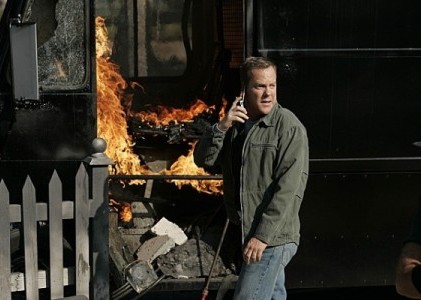5 on 24, Pt 3: A Paranoid Vein
The May 24 finale of the political-action series 24 marks the end of one of the most stylistically fresh and politically controversial programs in broadcast TV history. The video essay series 5 on 24 examines various aspects of the show, including its real-time structure, its depiction of torture, and the psychology of its hero, counterterrorist agent Jack Bauer. To view part 1, click here; part 2, click here; part 4, click here; and part 5, click here.
The following video essay takes place in real time.
Beyond its action film lineage, 24 owed a lot to conspiracy thrillers and other films in a paranoid vein.
This subgenre flowered from the early '60s through the early '80s. It was fed by the murder of JFK, Vietnam, Watergate, and revelations of CIA plots, covert wars, and secret surveillance of protesters. Bits and pieces of it have endured right up through the present.
This mode of film storytelling is about corruption, moral fatigue, and cynicism about power. It captures a collective feeling that the world is controlled—and perhaps has ALWAYS been controlled-by dark forces.
Who are those dark forces? The other guys, of course.
After 9/11, liberals believed that thug conservatives and their corporate masters were exploiting fear of future attacks for economic and political gain. Conservatives feared that liberals were clueless, lily-livered, Kumbaya-singing wimps who would weaken America by trying to understand and negotiate with forces that wanted to destroy us.
No side, indeed no person, enjoyed total confidence. It was a world in which everyone was compromised and no one could be trusted.
24 put a bloody comic-strip version of that world on TV screens week after week.
It makes sense that the Republicans, America's Daddy Party, would embrace and even worship 24. Every episode of every season was about a macho man protecting America against real, and vicious, foes.
At the same time, though, the show's curdled cynicism about American self-interest was basically left-wing. 24 believed that for every evil faction coming at us from outside, there were multiple factions inside the U.S. trying to exploit, manipulate, even create a threat for personal gain.
Jack Bauer epitomized the show's equal-opportunity cynicism. As a career soldier, he knew that much of the violence visited upon America from outside was collateral damage, caused by corporate arrogance or foreign policy blowback. The latter was the driving force behind Season 1. The plot found Jack and future president David Palmer being threatened with revenge over a humanitarian mission—approved by Palmer and carried out by Jack—that accidentally killed an arms dealer's family.
24 conflated fears of the right and the left throughout its run. There are more examples than can be listed here, but for illustration's sake, we'll concentrate on Season 2.
Now president Palmer, a Democratic leader in the Bill Clinton or Al Gore vein, struggled to stop a nuclear bomb from detonating on American soil. In the process, he discovered that the whole crisis was a set-up, devised by right-wing elements in American government who were tired of his dovish defense policy.
Palmer's enemies were a mix of ideological zealots and war profiteers. They hoped to force a showdown between the United States and three unnamed Middle Eastern countries—24's stand-in for President Bush's Axis of Evil.
Palmer's enemies even hoped to use the 25th Amendment of the Constitution to replace Palmer with an ambitious, reactionary vice president who would do whatever his political and corporate masters said.
This audacious scenario satirized the belief of many conservative Americans, which held any politician who proposed a nuanced response to terrorism was insane, a sissy, or both.
It's worth pointing out that Season 2 started in fall 2002, when the Bush administration was pushing to invade Iraq over alleged weapons of mass destruction.
The show's general outlook was stereotypically right-wing. But when it came to specifics, its politics weren't so clear-cut.
24 offered something to alarm everyone. ![]()
LATEST ARTICLES
-20140814-173707-thumb3.jpg)
Fighting Words
by Imogen Sara Smith
posted August 12, 2014

Fighting Words, Part 2
by Imogen Sara Smith
posted August 20, 2014

On the Margins: The Fil…
by Andrew Chan
posted August 12, 2014

Robin Williams: A Sense…
by David Schwartz
posted August 12, 2014
 5 on 24, Pt 3: A Paranoid Vein
5 on 24, Pt 3: A Paranoid Vein
 5 on 24, Part 3
5 on 24, Part 3
THE AUTHORS
San Antonio-based film critic Aaron Aradillas is a contributor to The House Next Door, the founder and publisher of Rockcritics.com and the host of “Back by Midnight,” an Internet radio program about film and television.
More articles by Aaron AradillasMatt Zoller Seitz is a writer and filmmaker whose debut feature, the romantic comedy Home, is available through Netflix and Amazon. His writing on film and television has appeared in The New York Times, New York Press, and The Star Ledger, among other places. He is also the founder of The House Next Door, a movie and TV criticism website.
More articles by Matt Zoller SeitzAuthor's Website: The House Next Door

